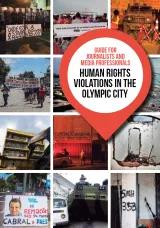Guide for journalists and media professionals: Human rights violations in the Olympic city
The Brazilian non-governmental organization Justiça Global, partner organization of the Heinrich-Böll-Foundation, released a “Guide for journalists and media professionals – Human rights violations in the Olympic City”. The document addresses some of the main human rights violations that occurred during the city’s preparation process for the mega event. The publication intends to be a tool that allows journalists to know the other side of this mega event, which resulted in the aggravation of processes of segregation, control and privatization of public spaces, and extermination of the black, poor population in the city.
There are 25 themes, ranging from sports facilities such as the Maracanã Stadium, police lethality, evictions of families from the favelas to the emergency legislation created for the Games, such as the Anti-Terrorism Law. At the end of each text, journalists can find links for more information, as well as the direct contacts of sources dealing with each topic, making it easier to search for discourses that contrast with the State, IOC and COB’s official discourse.
Divided into eight axes, the guide addresses the myriad of rights violations that constitute the less obvious side of Rio 2016 Olympic Games. These violations affect the environment and the traditional ways of life – as it has been happening at the Guanabara and Sepetiba Bays. That is also the case of the Olympic golf course, where thousands of square kilometers of native vegetation were destroyed. The publication also reports violations concerning the right to housing, highlighting the impact caused by the greatest forced eviction policy in Rio’s history, with more than 77,000 people displaced from their homes.
The guide addresses updated segregational and racist policies of urban control, with the repression and expulsion of street vendors, the compulsory removal of homeless people from the streets, mass incarceration and deployment of military troops into slums and suburbs. In the set of violations perpetrated, not even athletes, sports enthusiasts and amateurs were spared: training complexes, such as the Julio Delamare Aquatic Park, the Celio de Barros Athletics Stadium or the Lagoa Rowing Stadium were dismantled or disabled.
By listing some of the main arbitrary acts promoted in the name of the Olympic Games, the guide seeks to help readers realize that, like all stories, the Olympics also have a different side to it.
- The publication is also available in Spanish and Portuguese
The non-governmental organization RioOnWatch has also put together “Olympics Resources for Journalists” – focusing especially on essential materials about Rio’s favelas and the city’s pre-Olympic transformations, organized to support informed and nuanced reporting through the Games.
